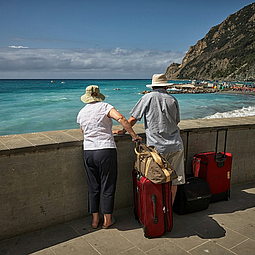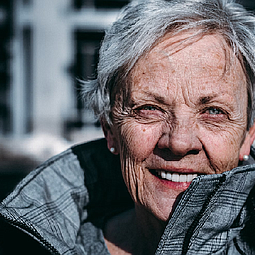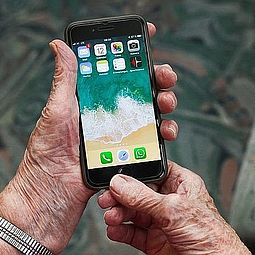The Island That Time Forgot
March 25, 2013 at 1:12 p.m. | Updated March 11, 2013 at 4:50 p.m.
In October, 2012 The New York Times published an article entitled The Island Where People Forget to Die by Dan Buettner.
In the article we meet 97-year-old Stamatis Moraitis. In 1943 Moraitis moved to the United States from a small island in Greece seeking medical treatment for an arm mangled during the Greek civil war. He found a job in the U.S. and decided to stay. Years later, in 1976 when he was in his mid-60s, Moraitis was diagnosed with lung cancer. He was given nine months to live.
Instead of seeking medical treatment, he and his wife moved back to his homeland, the Greek isle of Ikaria. He wanted to be buried with his ancestors.
The months came and they went but still he didn’t die. “Today,” writes Buettner, “three-and-a-half decades later, he’s 97-years old…and cancer free.”
Dan Buettner is the founder of Blue Zones, an organization researching the world’s longest living populations.
The article focuses on the Greek island of Ikaria and reports that Ikarians reach the age of 90 at two-and-a-half times the rate Americans do. They not only live longer, but with more vitality and fewer occurrences of cancer and cardiovascular disease – not to mention about a quarter the rate of dementia.
“On Ikaria…people have been managing to stay sharp to the end,” writes Buettner.
For over a decade, Buettner, with support from the National Geographic Society, has been studying the places throughout the world where people live the longest. Ikaria is one of five locations Buettner has identified as “Blue Zones” of longevity. The others are Nicoya, Costa Rica, Okinawa, Japan, Sardinia, Ital, and Loma Linda, California.
Buettner and his team have identified the common lifestyle practices of the long-lived elders from these Blue Zones.
“There’s no silver bullet to keep death and the diseases of old age at bay. If there’s anything close to a secret, it’s silver buckshot,” writes Buettner.
Blue Zones Power 9 Secrets of Longevity:
In 2000 a team of scientists and I began studying cultures where people live longest. The residents of these “Blue Zones” don’t diet or belong to health clubs, but they do share common healthy behaviors. We call them the Power 9: --Dan Buettner
1 Keep Moving
Find ways to move naturally, such as walking, gardening, using fewer labor-saving devices.
2 Find Purpose
And pursue it with passion.
3 Slow Down
Work less, rest, take vacations.
4 Stop Eating...
...when you’re 80 percent full.
5 Dine on Plants
Eat more veggies, and less meat and processed foods.
6 Drink Red Wine
Do it consistently but in moderation.
7 Join a group
Create a healthy social network.
8 Feed your soul
Engage in spiritual activities.
9 Love your tribeMake family a high priority.
FYI
Zinc Deficiency Linked to Aging
A new study from the Linus Pauling Institute at Oregon State University has shown that zinc deficiency can develop with age, leading to a decline of the immune system and increased inflammation associated with many health problems, including cancer, heart disease, autoimmune disease and diabetes. About 40 percent of elderly Americans have diets that are deficient in this important micronutrient, the study concludes. The study author recommends that all seniors should take the full RDA for zinc, which is about 11 milligrams a day for men and 8 milligrams a day for women. Future studies may recommend higher intake for seniors, but levels of zinc intake above 40 milligrams per day should be avoided, researchers said, because at very high levels they can interfere with absorption of other necessary nutrients including iron and copper.
Aging Our Way
In 1998, Hallmark unveiled their new “One-Hundredth-Birthday” cards, and by 2007 annual sales were at 85,000. America is rapidly graying. But how long people live raises the question of how well they live. Aging Our Way by Meika Loe, follows the everyday lives of 30 elders (ages 85-102) living at home and mostly alone to understand how they create and maintain meaningful lives for themselves. Drawing on the latest interdisciplinary scholarship on aging and three years of interviews with the elders, Meika Loe explores how elders navigate the practical challenges of living as independently as possible while staying healthy, connected, and comfortable. In their own voices, elders describe how they manage everything from grocery shopping, doctor appointments, and disability, to creating networks of friends and maintaining their autonomy. The lessons they have learned – including living in moderation, asking for help, keeping a sense of humor, caring for others, and preparing for death – provide an invaluable source of wisdom for anyone hoping to live a long and fulfilling life.





